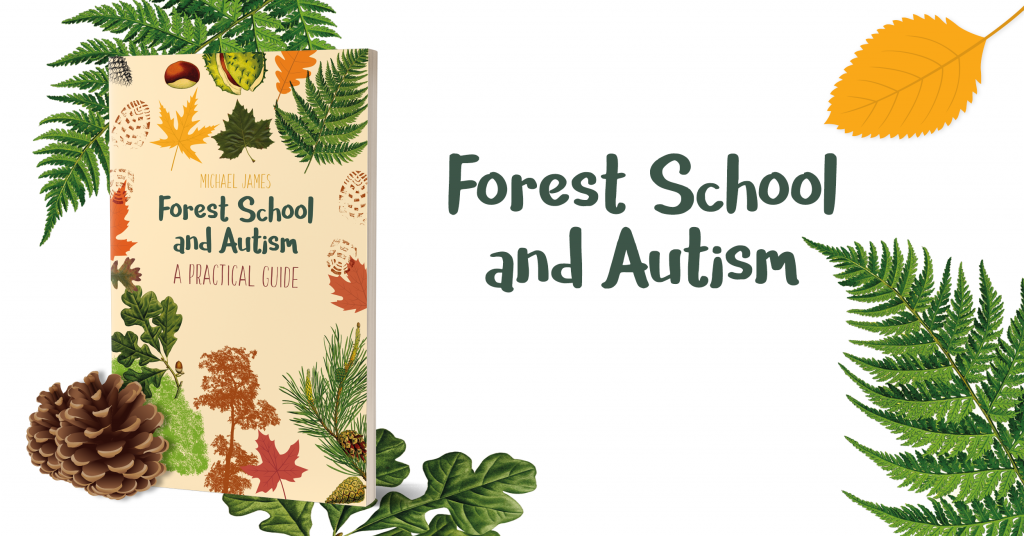Upon the release of his book, Forest School and Autism, we spoke to author and practitioner Michael James about what exactly Forest School involves, and why it’s so well suited for autistic learners.
What exactly is meant by the term ‘Forest School’?
The term “Forest School” describes a specific approach to outdoor learning. Forest School has a strong ethos of learner-centered practice combined with an understanding of the benefits to wellbeing which come from regular contact with nature. Forest School is attended by people of all ages and abilities.
How is Forest School suited to the needs of autistic people?
Well, I’m always very aware of the saying “If you’ve met one person with autism, then you’ve met one person of autism”! The learner-centered ethos of Forest School seeks to accommodate the individual needs of different learners, and this flexibility can allow autistic learners the space to be themselves and engage on their own terms. This space includes the physical space of natural settings, which is far greater than in indoor settings, and also there is more space in time afforded by the Forest School approach. In my experience, this approach can suit autistic learners very well. Another strength of Forest School is the heightened awareness of place which can encourage practitioners to consider the sensory environment which is obviously important when learners have different sensory needs. For Forest School to best meet the needs of autistic learners the practitioner needs to develop autism awareness, and this book aims to promote and encourage that.
Can people in urban areas adopt the ideas from your book?
Forest School takes place in towns and cities just as much as in the countryside. Urban areas have green spaces and these places often contain at least as much wild nature as you’ll find in rural areas. Wild natural spaces, rural or urban, often seem to me to be a metaphor for neurodiversity, despite the differences between the living things in these places they coexist and are all of equal value.
How did you become involved with Forest School and autism?
I had worked for years supporting autistic people of differing abilities and ages in a variety of settings, and love this work, so I have always approached Forest School from this perspective. In my personal life I grew up with an interest in nature and wild places and ended up living off the grid on a rural site. One of the most rewarding parts of support work for me has always been creating opportunities for the people being supported. I volunteered at my son’s Forest School and immediately had a light bulb moment and could see how this would be a great opportunity to offer the people I worked with.
Initially I set up a Forest School for the NAS and we got very positive feedback from people attending, Occupational and Speech and Language Therapists and other professionals. In our first year I was a finalist in the Laing Buisson Awards and was later chosen to give a presentation at the Autism Europe Congress in Edinburgh. I am a member of the Forest School Association and have run Autism Awareness workshops for their members.
What have been some of your best experiences using Forest School techniques with autistic learners?
To be honest, they happen all the time! At it’s heart Forest School aims to help people to achieve and meet their potential and seeing this happen is a joy. I could write a whole other book listing individual experiences and some of them are described in the book.
Forest School is also fun, it really isn’t a terribly earnest thing, it’s a pleasure and you create a space where autistic people and neurotypical people do things together with mutual respect and understanding. We can be equal in wild places, they belong to us all and all our different ways of experiencing them are valid if they respect the space.
My autistic learners teach me as much as I ever teach them. My learners have given me fresh perspectives on the spaces we share and how to enjoy them. It’s part of the Forest School ethos that we are all learners at Forest School and this is never truer than when you are lucky enough to go down into the woods with an autistic learner.
You can learn more about this book on our website Here. If you would like to read more articles like this and get the latest news and offers on our books about autism, why not join our mailing list? We can send information by email or post as you prefer. You may also be interested in liking our Autism, Asperger’s and related conditions Facebook page.

